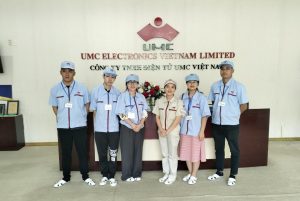In an online exchange with the topic “Vocational education: first an apprenticeship then university” organized recently by Dan Tri in collaboration with the Ministry of Labor, Invalids and Social Affairs (MOLISA), Deputy Minister Le Quan said that, for a long time, we only focused on academic education, favored high degree, which led to many consequences.
 Online exchange with the topic “Vocational education: first an apprenticeship then university”
Online exchange with the topic “Vocational education: first an apprenticeship then university”
In an online exchange with the topic “Vocational education: first an apprenticeship then university” organized recently by Dan Tri in collaboration with the Ministry of Labor, Invalids and Social Affairs (MOLISA), Deputy Minister Le Quan said that, for a long time, we only focused on academic education, favored high degree, which led to many consequences.
According to Mr. Pham Xuan Khanh, Rector of the Hanoi High-Tech Vocational College, there are many reasons why vocational schools failing to attract students such as parents are still giving preference for high degrees and education levels, wishing that their children will be successful in the future, or afraid that their children will find it hard and difficult; communication work was not well carried out as well as many parents do not know about the inadequacy of the current labor structure due to the higher rate of university education leading to high unemployment rate or university students hiding their degrees to work or study a college diploma.
Teacher Pham Xuan Khanh assumed that in order to compare the capacity of college and university graduates, the opinion of businesses would be the most objective. Businesses prefer to recruit college students because they have better skills, be able to participate in the production work of businesses right after graduation, bringing immediate results. In particular, college graduates always have a better spirit, attitude in implementing the rules and regulations of the business, never demand too much, rarely “job-hop”, etc.
Besides the concerns of many students as well as parents, there is still the fact that many businesses today, especially FDI enterprises, just want to recruit ordinary labors then train them in accordance with their business’s format, leading to “gap” between vocational training and reality, Mr. Le Quan, Deputy Minister of Labor, Invalids and Social Affairs said that, according to the Ministry of Planning and Investment statistics, the foreign direct investment enterprises (FDI enterprises) are creating jobs for more than 3.6 million direct laborers and about 5-6 million indirect laborers. However, it is worth mentioning here that the labor attraction of FDI enterprises is still in favor of exploiting untrained labor sources with low labor costs.
In the market economy, we can hardly force businesses to recruit trained workers if businesses have no need for them. The government is aware of the situation and is working on solutions. Besides attracting investors that are applying high-tech, we still need to attract FDI into some areas to create jobs and reduce unemployment. We are developing policies associated with employee retraining in the medium and long term. Currently, a project to retrain laborers to face the opportunities and challenges of the 4th Industrial Revolution is being developed by MOLISA.
Mr. Le Quan also assumed that the Industrial Revolution 4.0 will create many opportunities for vocational education such as vocational schools will have the opportunity to shoulder the mission of training and retraining labor resources; new technologies will bring innovation to the vocational education and school administration; vocational schools will have the opportunity to innovate programs and organize training activities, etc.
Currently, the Vietnamese vocational education system has nearly 2,000 vocational education institutions that provide training in many different professions at elementary, intermediate and college levels. The Deputy Minister of Labor, War Invalids and Social Affairs also suggested to parents and students the professions with high demand for labor resources in Vietnam in the coming years will be in the fields of information technology, engineering technology, mechanics; electrical, electronic and telecommunications engineering technology; foreign languages; tourism & hospitality; beauty services and medical care, etc. Mr. Le Quan also advised parents and students to carefully consider the choice of vocational training place to match their capacity as well as the trend of the labor market.












 TIKTOK
TIKTOK